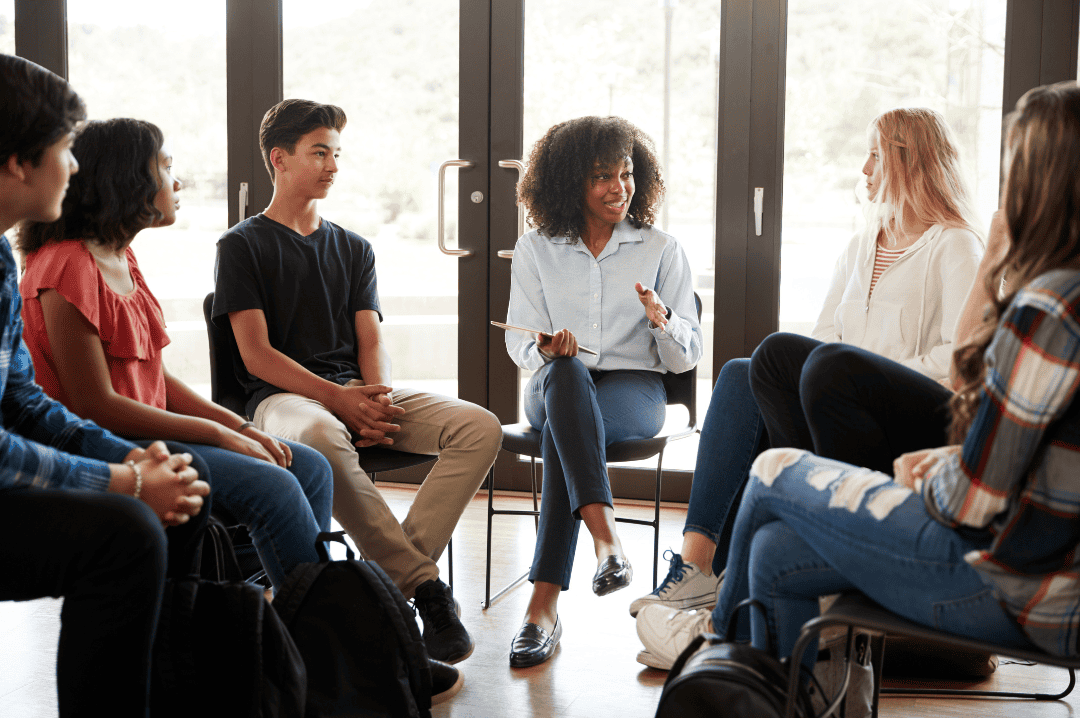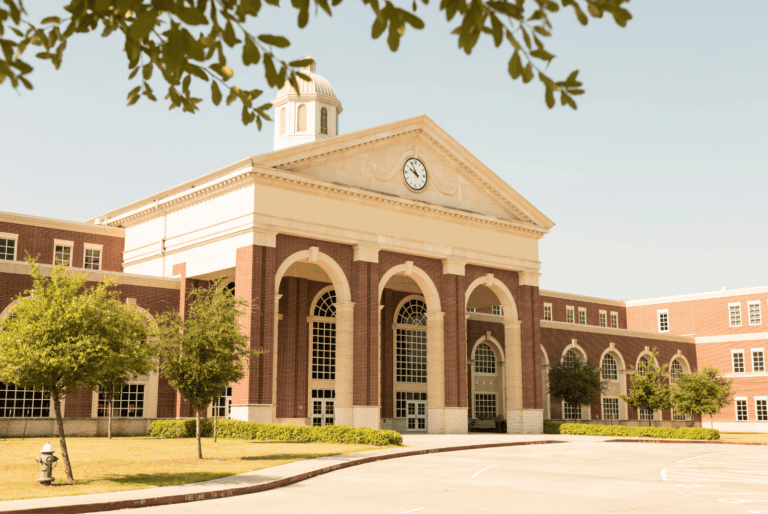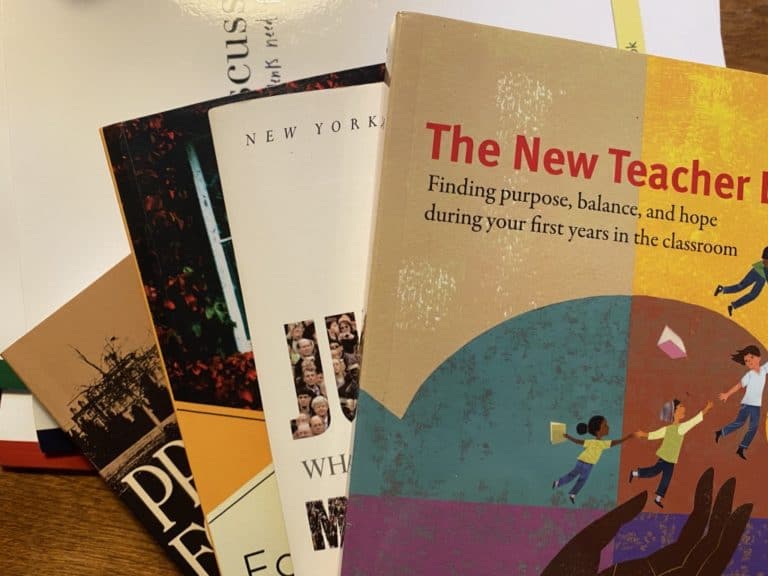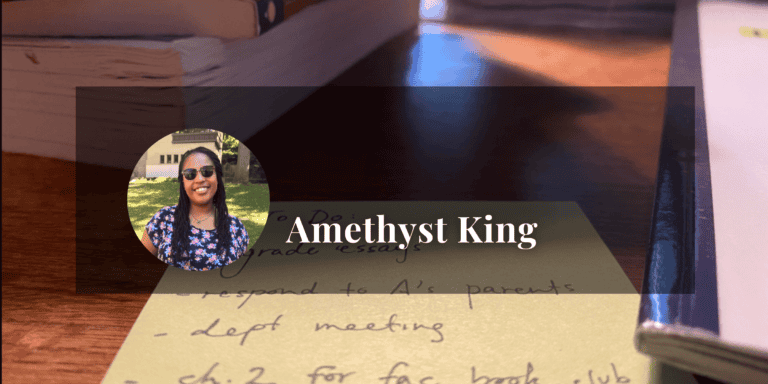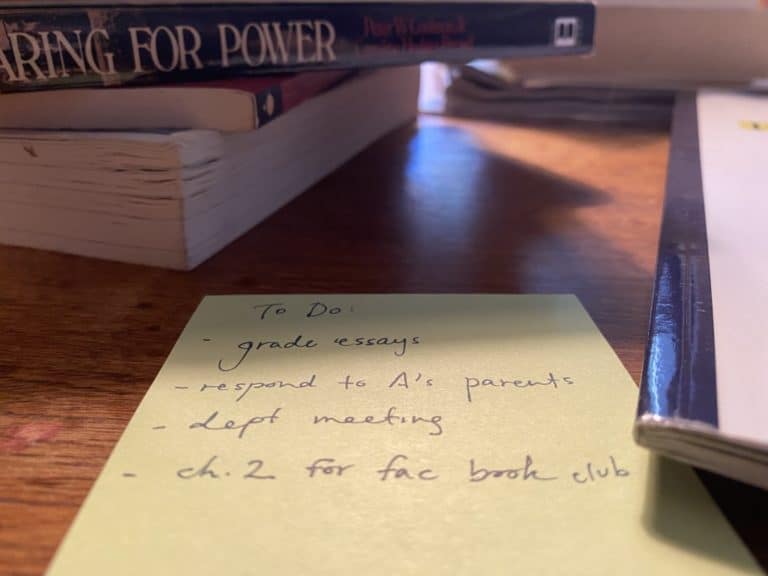Understanding and Redirecting Disagreements: An Interview with Dr. Ruth Braunstein
Dr. Ruth Braunstein is the founder of The Meanings of Democracy Lab at the University of Connecticut. The lab engages students and partners in collaborative research and discussion about the contested moral and cultural foundations of American democratic life. What follows is a conversation between Ruth and R.E.A.L. Director of Program Emily Gromoll. The interview has been lightly edited for clarity.

Emily: Tell us a little bit about The Meanings of Democracy Lab. What do you do? What’s the mission? And what led you to the work?
Ruth: The idea for the lab grew out of an interest in expanding my work with undergrads who wanted to gain research experience, while also connecting that research to broader debates we were having on our campus about democracy. We’ve been having more of those conversations since 2016, when the Trump campaign in particular raised a lot of questions about what it means to live in a democracy.
The theme of the lab, “Meanings of Democracy,” came out of a consistent finding of my research, which is that Americans don’t just disagree about specific policy issues or even broader political ideas. Rather, we fundamentally disagree about what it means to be an American, what it means to live in a democracy, and what good citizenship looks like, given our understanding of how the political system should work.
Americans don’t just disagree about specific policy issues or even broader political ideas. Rather, we fundamentally disagree about what it means to be an American, what it means to live in a democracy, and what good citizenship looks like.
Dr. Ruth Bruanstein
I’m a sociologist, so my goal is not actually to resolve those debates. Rather, my goal is to understand those disagreements better and give my students and our community tools to have those direct conversations a little bit better, so we’re actually recognizing that our disagreement is about these more fundamental issues as much as it is about the nuts and bolts of a particular policy issue.
Emily: That’s so interesting, because it feels in a lot of ways like you’re peeling away the layers of an onion. I’m curious about what the process has been for your undergrads as they do the research. Have they uncovered how to engage in conversations about citizenship and democracy in a way that doesn’t make them feel like their own identities are being attacked?
Ruth: One of the things that gets complicated about having conversations about citizenship and democracy is that for many people, their understanding of these topics is really clearly rooted in their social location, which is linked to their identity. For example, we did a contest a couple of years ago, where we asked people, what does America mean to you? Many of the students that responded to that reflected on their social identity as a new immigrant. They reflected both on the opportunity that coming to the U.S. had given them but also recognized that they occupied a marginal position, either racially or ethnically, and that they had to navigate that marginality. Or, African-American respondents wrote about having to grapple with the history of exclusion of their communities, and figuring out how to navigate contemporary debates about political inequality. Some white middle class students were reflecting for the first time on their privilege in American society and politics and on how they can use their privilege and power for the good of the community.
I think we’re in a place where our young people are really aware of how their identity shapes their political and social positions and power, and that awareness is shaping how they’re thinking about these questions about what democracy means. I think one of the challenges is figuring out how to recognize that that’s kind of constitutive to people’s perspectives on this while also having a conversation that doesn’t feel like a personal attack.
Emily: Have you found any mechanism in your research or in the way in which you’re working with undergrads that allow students to have a conversation in which they’re able to disagree without being disagreeable?
Ruth: John Rawls, a political philosopher, uses a concept called the “veil of ignorance,” where any time you think about what a political system should look like, you need to imagine that you could be born into any social position within that system. It’s an exercise that involves both thinking about your own identity and social location, but also empathizing with people who are in other positions. It’s a constant process of trying to encourage kids to be reflexive about how they benefit personally and how others might understand a system’s benefits or downsides.
Emily: A related question: one of our favorite buzzwords is “intellectual humility.” What does that actually look like? What does it sound like when it happens?
Ruth: One thing I always like to preface a conversation about intellectual humility with is that I actually don’t think it means that you can’t have strong opinions. Democracy actually depends on people having strong convictions and being willing to volunteer their time in all kinds of ways to fight for the vision of society that they think is good.
The key is that you have to earn those convictions through a constant process of conversation with people who disagree with you. What we need to help people do better is to have those conversations with people who disagree with them, and enter those conversations with intellectual humility, which to me just means a recognition that we may not already know everything, and a willingness to potentially change our minds by seeing someone else’s perspective, listening to their reasoning, and gaining new information. The moment we shut down our brains and say, “we already know everything we need to know about the world,” then those conversations aren’t possible.
What we need to help people do better is to have those conversations with people who disagree with them, and enter those conversations with intellectual humility.
Dr. Ruth Braunstein
Emily: If we’re focused on intellectual humility, the gut reaction is to say that the opposite (intellectual arrogance) is bad – but perhaps there’s a role for it. When is that? What are the conditions that make that kind of confidence a good thing?
Ruth: I think it is helpful to distinguish between intellectual arrogance, which conveys that complete closed-mindedness to anyone else’s input, and confidence that one can have in one’s own perspective. I also think it’s important to think about confidence from the perspective of people who are often doubted. There are patterns of whose opinions are taken seriously without very much pushback, and whose experiences are often doubted even when they are thoroughly vetted and tested. Trying to figure out where to find a middle ground there requires that we recognize those power imbalances in who is considered an authority or an expert or trustworthy, and once again being really reflexive about making sure we’re applying those assumptions equally to everyone.
If we’re starting to doubt somebody’s knowledge or experience, it’s helpful to think: why am I doubting this? Why am I not trusting this person to be telling me the truth? Is it because I have some sort of bias that assumes they can’t be knowledgeable about this subject? Why am I making that assumption? And then, conversely, saying, Why am I trusting this person outright? Why do I assume they are knowledgeable or an expert? Can I interrogate that more fairly? It’s sort of about trying to gauge that.
Emily: Do you have an activity you do with your undergrads at the beginning of the year to “norm” intellectual humility?
Ruth: I do have some norm setting activities that I do, particularly in my classes that involve political conversations.Those involve thinking about why some people would be more comfortable sharing their political opinions than other people in the class, and why the stakes are different for different people. We think through the risks of political disagreement for different people.
Students from underrepresented backgrounds will often say that for them, there is sometimes a risk of sharing how they are negatively impacted by policies that can feel more abstract to middle class students. It can feel very vulnerable for more marginalized students to share their personal experiences of being impacted. More conservative students will sometimes share that they’re worried that they could be kind of canceled or judged. Especially this year, students have raised concerns that their current or future job prospects could be threatened if they “say the wrong thing” about the upcoming election or about ongoing conflicts around the world.
We bring all these anxieties into political conversations. In my work, we try to put those anxieties out there and talk through ways to overcome them, so we can have honest conversations with safeguards in place. I often have students take sides on issues that I assigned to them, so they have to imagine someone else’s perspective as opposed to revealing their own attitudes about issues.
Emily: Are there certain skills or experiences you wish your undergrads would have practiced in high school or middle school before they reach your class?
Ruth: I think that it would be great if students were more comfortable making an argument: i.e., not just asserting their position, but offering evidence and reasons to support that position, then being able to recognize what opposing voices are likely to challenge them on and having an answer in mind for how to defend against those challenges. That to me is a building block skill that feels important, and it’s not something that comes naturally to most students
Emily: It’s interesting, because some of the best discussion questions our students grapple with are really about considering how someone else might disagree with what you’ve observed or interpreted.
Ruth: I think it’s always hard to move from a dynamic with students where you’re telling them the answer, to giving them the tools to say, well, what if you interpret it this way? There is more than one way to interpret data, right? And so kind of inviting them into being able to do that, and thinking about the implication of one interpretation of this data. But that doesn’t lend itself well to a multiple choice test where there’s one answer.
Emily: What do you see as the role of K-12 education within a democracy? Are there particular skills that are specially developed in K-12 education that you feel are fundamental to good citizenship?
Ruth: When we talk about K-12 education at a policy level, there’s often so much focus on how our schools are preparing students for the workforce, and not nearly enough focus on how we’re preparing them to be people – to be community members and to be civic actors. Of course, schools are doing that all the time, whether they realize it or not, because these schools are sites of such intensive socialization for young people at this really porous moment in their development.
When we talk about K-12 education at a policy level, there’s often so much focus on how our schools are preparing students for the workforce, and not nearly enough focus on how we’re preparing them to be people – to be community members and to be civic actors.
dr. Ruth Braunstein
One thing I really appreciate is that as we’re having more conversations about this, schools are becoming much more explicit and intentional about how they’re doing this work. I also think that the fact that the student body is becoming more diverse overall in our educational system has required more intentionality about this in particular. The part I think we need to be more focused on again has to do with how different students, depending on their social positions, are going to be able to participate in civic life. I come from a background of thinking a lot about political inequality, not just regarding which social groups vote more than others, but also regarding whose voices are taken more seriously in our political debates, and who’s considered more of a good citizen or more of a worthy citizen. Helping students to understand that backdrop and gain familiarity with different ways to become engaged should be part of how we understand our political system, even though they’re harder conversations to have, in order to equip all of our students to fully participate in civic life.
Emily: One thing we’re hearing that’s concerning is that middle and high school kids don’t know how to talk to each other. Kids would much rather text each other than have a real conversation, but we know it’s really important to be able to talk to each other, obviously. What do you see as some of some of the biggest challenges when it comes to conversation with kids?
Ruth: One thing that I do find makes a huge difference with my students is if I ask them to write before I ask them to talk, because there seems to be a reticence to speak off the cuff, when ideas don’t feel as well-formed. But if I give them five minutes to write down some ideas, or some questions, or some observations about something, they all have really thoughtful questions for each other, and they all want to talk.
Emily: That’s a big part of the work we do too! I think that preparing yourself to have more patience – not just to get your idea down, but to be ready to accept others – is huge.
Ruth: And to recognize, maybe I also have some questions that I’m not sure about. I think that’s very hard to teach younger kids, because they obviously understand very little about the world, but are quick to think that they are experts. That’s wonderful, right? You want to encourage confidence. But it’s harder to encourage that within an understanding of one’s own limitations.
Emily: I would agree with that. For sixth graders in our program, it can be really mind-blowing to learn that someone has another opinion or does something differently.
Ruth: And that they both can be correct. This is one of the processes that I talk to my grad students about: graduate school is often an incredibly humbling experience – which seems counterintuitive, because it’s also an experience where you become an expert on something.
You start that process thinking that you are already really knowledgeable about a topic. And then you spend 5, 6, 7 years learning how much else there is out there, what people already know about this topic, how much more complicated it is than you might have imagined, and how narrow your own contribution to that conversation can be. You really spend seven years figuring out everything you don’t know about a topic, so you can position what you do know more accurately.
Until you reach the end of that process, you mostly are feeling small, and being constantly humbled. Once you recognize that’s how it’s supposed to work, you learn that you actually are more knowledgeable when you recognize everything you don’t know.
Emily: That’s super powerful. It’d be huge for a high schooler to have the experience of realizing they will be more knowledgeable when they don’t know it all.
Ruth: And their knowledge will be more trustworthy, when they can actually answer a question by saying, Oh, I don’t know that, but I’d like to learn it..
Emily: Final question: are you reading any books or articles that you think would be powerful for our network of teachers?
Ruth: Yes. One is by a philosopher named Michael Patrick Lynch, who actually is my colleague at the University of Connecticut and was the principal investigator on the Humility & Conviction in Public Life project that I was a part of. He wrote a great book a couple of years ago, called The Internet of Us. The subtitle tells you a lot of what you need to know, which is: “knowing more and understanding less in the age of big data.”
I think about this book all the time, especially when I’m working with my students and thinking about research. You have everything at your fingertips, at least theoretically. What does that mean? If everything is Google-able, what’s the point of a test? What’s the point of memorizing information?
Thinking through, well, just because you have information at your fingertips doesn’t mean you know what to do with it, and it doesn’t mean you know how to piece things together or adjudicate between good and bad information. In his book, Michael gives a lot of really interesting ideas about how to think about those tools of conversation and how to think critically about information.
Emily: It’s especially important in an age of AI.
Ruth: Indeed, and it will only get worse. But there are also some amazing possibilities, right?
I also love this little book by Jill Lepore, called This America, in part because it’s a short way of thinking about some of our debates about American history and how to encourage a critical stance toward what many people learned about our history, and how we can incorporate those into an understanding of who we are as a country without losing a sense of national pride or a sense of national purpose. It’s about how history needs to be a constantly evolving process of listening to voices that were not included in the versions of history we might have learned originally.
Again, having a sense of humility about what we know about our past, and being willing to listen to people’s stories that have been left out, and then using that as a way of thinking in new ways about the future of the country, and where we can go from there.
